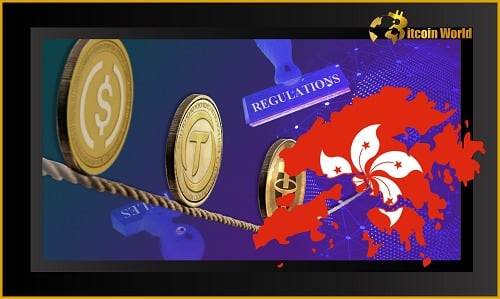Are you keeping up with the rapidly evolving world of cryptocurrency? If you’re invested in stablecoins or just curious about their future, you need to pay attention to Hong Kong. The Hong Kong Monetary Authority (HKMA), the city’s central bank, has just fired the starting gun on regulating stablecoins, and they want your opinion!
Hong Kong Explores Stablecoin Regulation: What’s Happening?
In a significant move signaling proactive engagement with the digital asset space, the HKMA has launched a public consultation to gauge sentiment on the regulation of crypto-assets, specifically stablecoins. This isn’t just talk; the HKMA aims to have a solid regulatory framework in place by 2023-24. This timeline demonstrates Hong Kong’s commitment to becoming a hub for fintech innovation while ensuring financial stability.
The foundation of this consultation is the HKMA’s “Discussion Paper on Crypto-assets and Stablecoins.” This document isn’t just a casual inquiry; it’s a deep dive into the complexities of stablecoins and the potential regulatory paths forward.
Why Now? The Stablecoin Surge and Global Regulatory Pressure
Why is Hong Kong, and indeed the world, suddenly so focused on stablecoins? The HKMA’s discussion paper highlights a key reason: explosive growth. Since 2020, the stablecoin market has ballooned in market capitalization. This rapid expansion hasn’t gone unnoticed by international regulatory bodies.
The paper points to concurrent regulatory recommendations from heavy hitters like:
- The Financial Action Task Force (FATF): Focused on combating money laundering and terrorist financing, FATF’s guidance impacts crypto regulation globally.
- The Financial Stability Board (FSB): Monitoring and making recommendations about the global financial system.
- The Basel Committee on Banking Supervision (BCBS): Setting global standards for bank regulation.
These international bodies are urging jurisdictions worldwide to get ahead of the curve and establish clear rules for crypto assets, especially stablecoins, due to their increasing integration with the traditional financial system.
Is Crypto a Threat to the Financial System? HKMA’s Perspective
While acknowledging the rapid growth, the HKMA currently believes that the overall crypto market doesn’t pose an immediate systemic risk to the global financial system due to its current size. However, they aren’t dismissing the potential for future risks. The discussion paper emphasizes a critical point:
“The growing exposure of institutional investors to such assets as an alternative to or to complement traditional asset classes for trading, lending and borrowing […] indicate growing interconnectedness with the mainstream financial system.”
This interconnectedness is the key concern. As institutional investors, who manage vast sums of capital, increasingly engage with crypto, the potential for shocks in the crypto market to ripple through the traditional financial system increases. Consider this:
- In December 2021, the global stablecoin market cap was already over $150 billion.
- This represented about 5% of the entire crypto-asset market at that time.
These numbers, while seemingly small in the grand scheme of global finance, are significant and growing rapidly. The HKMA is acting preemptively to manage potential risks before they become systemic.
What Regulatory Paths are on the Table?
The HKMA isn’t just asking for general feedback; they’ve laid out five potential regulatory approaches, ranging from minimal intervention to a complete ban. They’ve also posed eight specific questions to guide stakeholder responses. Let’s break down the five possible regulatory outcomes:
- No Action: This would mean maintaining the status quo with no specific regulations for stablecoins.
- Opt-in Regime: Creating a voluntary framework where stablecoin issuers could choose to be regulated.
- Risk-Based Regime: Implementing regulations tailored to the specific risks posed by different types of stablecoins. This is likely the most nuanced and potentially effective approach.
- Catch-all Regime: Broad regulations that encompass a wide range of crypto-assets, including stablecoins.
- Blanket Ban: Prohibiting stablecoins entirely within Hong Kong. This is the most extreme option and seems less likely given Hong Kong’s pro-innovation stance.
The HKMA is clearly seeking input to determine the most appropriate path forward. The fact that they are considering a range of options demonstrates a thoughtful and comprehensive approach to regulation.
Have Your Say: How to Participate in the Consultation
Do you have thoughts on how Hong Kong should regulate stablecoins? Now is your chance to be heard! The HKMA is actively seeking feedback from stakeholders. If you’re involved in the crypto space, or even just have a strong opinion on the matter, consider responding to their consultation.
Key Dates:
- Deadline for Responses: March 31, 2022.
- Target Implementation: No later than 2023/24.
While the March 31, 2022 deadline for this specific consultation has passed, this initiative highlights the ongoing and evolving nature of crypto regulation in Hong Kong. It’s crucial to stay informed about these developments as they will shape the future of digital assets in the region and potentially beyond.
Related Posts – Ex-SEC Chair, Jay Clayton Believes Cryptocurrency Industry Is For Long Haul
In Conclusion: Hong Kong’s Proactive Stance on Stablecoins
Hong Kong’s move to consult the public on stablecoin regulation is a significant step forward. It demonstrates a proactive and forward-thinking approach to managing the risks and opportunities presented by digital assets. By engaging with stakeholders and considering a range of regulatory options, the HKMA is aiming to create a balanced framework that fosters innovation while safeguarding financial stability. Keep an eye on Hong Kong – their approach to stablecoins could become a model for other jurisdictions around the world as they grapple with regulating this rapidly evolving space.
Disclaimer: The information provided is not trading advice, Bitcoinworld.co.in holds no liability for any investments made based on the information provided on this page. We strongly recommend independent research and/or consultation with a qualified professional before making any investment decisions.





